
Trapezoidal tile
National Museum in Szczecin
Part of the collection: Antiquity
The gold plate has the form of a symmetrical wedge with a base that is oval in cross-section. It is decorated only on the external side with a pseudo-beaded ornament and a motif of concentric circles. In the collection of the Department of Archaeology of the National Museum in Szczecin there are two such nearly identical gold plates from Skalin, found together. Details of the discovery of the gold plates are unknown, as is the context in which they occurred. All that is known from the sparse archival data is that the two items were found by accident in the 1930s, at a gravel pit near Skalin. The gold plates may have come from a destroyed grave. Although their purpose remains a mystery, it is presumed that they were fragments of a neck-ring or a bracelet. They can be associated with the Dębczyno group and dated to the 5th century. The Dębczyno group was named after the town of Dębczyno near Białogard, where two cemeteries of this population were discovered before World War II. Later, other settlements and necropolises were discovered in the Parsęta River valley. The Dębczyno group inhabited Western Pomerania in the late Roman period and the Migration Period, i.e., from the end of the 2nd to the 6th century. It is assumed that this is the part of the population of the Wielbark culture, which did not participate in the migration from Pomerania to the south-east.
Bartłomiej Rogalski
Author / creator
Dimensions
cały obiekt: width: 4.8 cm
Object type
tile
Technique
casting
Material
gold
Creation / finding place
Owner
Muzeum Narodowe w Szczecinie
Identification number
Location / status

National Museum in Szczecin

National Museum in Szczecin

National Museum in Szczecin
DISCOVER this TOPIC
National Museum in Lublin
DISCOVER this PATH
Educational path